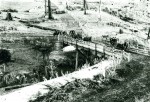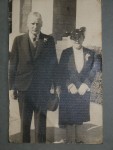MARKS, Cecil Solomon
Cecil Solomon Marks was the son of Edward Marks and his wife, Fanny (nee Benjamin). He was born on 4 March 1876 at the family home, 2 Burlington Terrace, 398 Albert Street, East Melbourne where Edward and Fanny continued to live until their deaths in 1900 and 1909 respectively. At the time of his marriage in 1861 Edward was described as a merchant with premises at 13 Flinders Lane east. Sue Webster, a descendant, states that he was a draper with the family nickname of Teddy the Trimmer. His mother's family, the Benjamins, were a prominent East Melbourne Jewish family.
According to his attestation paper signed on 29 November 1915 Cecil was a grazier and living at Leongatha. He nominated his sister, Florence, as his next of kin. He admitted that he had been previously rejected for service on account of his teeth.
By 2 May 1916 he was with the 19th Depot Battalion at Geelong but on 15 August 1916 he was transferred to the 2nd Pioneer Battalion, 5th Reinforcements and sent to Seymour for training. He embarked 18 September 1916 aboard HMAT Karroo and disembarked at Plymouth 15 November and was taken on strength the same day. He proceeded overseas to France on 5 April 1917 and joined his unit in the field on 30 April. On 4 May 1917 he was wounded in action and suffered shell shock for which he spent ten days in hospital. He was admitted to hospital again on 15 February 1918 with lumbago which kept him out of the action for over two months. In May he was back in hospital with debility. He was taken to England and returned to Australia on 20 November 1918.
After returning to Australia he married Ivy May and continued life as a farmer at Allambee, Gippsland, a property which had been turned into a soldiers' resettlement estate. He died on 23 April 1944 at the West Gippsland Hospital, Warragul.
Postscript: Susan Webster has emailed further information about Cecil's life, as follows:-
There is quite a lot of background to his war service. He doggedly volunteered despite his age and also despite the fact that farming was an exempt occupation. The consequences of the shell shock post-war saw him unable to handle normal family life. He reportedly used to shoot at the outside 'dunny', thinking it was a German post. My mum recalled often being baled up in there, reading the torn newspaper sheets and waiting for him to stop shooting.
He was a dairy farmer, not a 'grazier'. Nor was he a particularly good farmer. He did not share the usual parsimony of farmers - he fed his workers turkey, he bought the area's first car, steam-driven milking machine and wireless (all great extravagances). Post-war he appears to have suffered mentally as well as economically. He leased out the farm and herd while he was on duty and came back to find both severely neglected. My mother recalled money coming from Melbourne relatives and hand-me-down clothes sent from wealth family members in NZ (My great-aunt Kate married into the Nathan family - of Lion Nathan beer). She said exquisite barely-worn children's clothes in lace and velvets, would spill out of the parcel, only to be torn up by her father as udder cloths for use in the dairy.
He spent a lot of time trying to invent things, notably a floor polish that only needed one application for life. Family legend was that the recipe was bought by a commercial polish firm and destroyed!
Widespread clearing through Hallston led to many landslips and there are records of sizeable slips on his farm. You can see evidence of the landscape in this photo http://arrow4.lib.monash.edu.au:8080/vital/access/manager/Repository/monash:3669
It is still called the Marks Bridge, in Hallston and the photo is taken from the corner of Grandpa Marks' farm.
They had two children, Ivy had three from an earlier marriage and after Cecil's death she went to live with another man Billy Dutton, until her death in Castlemaine.
Grandpa Marks is buried at the Melbourne General Cemetery.
Susan Webster, emails 24 Oct 2014 with photo and information


